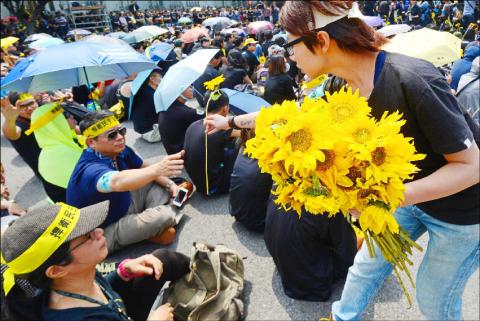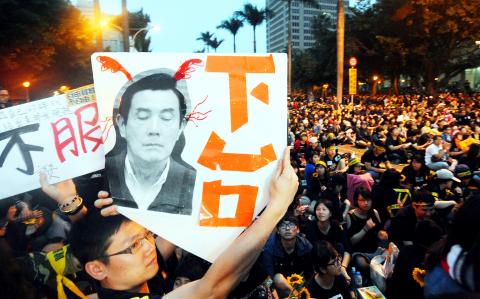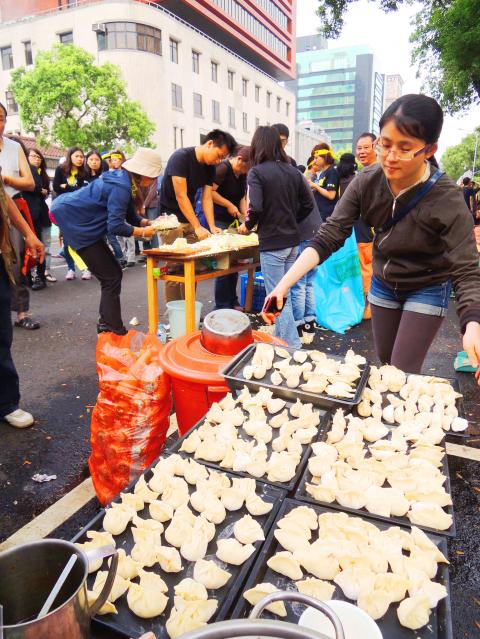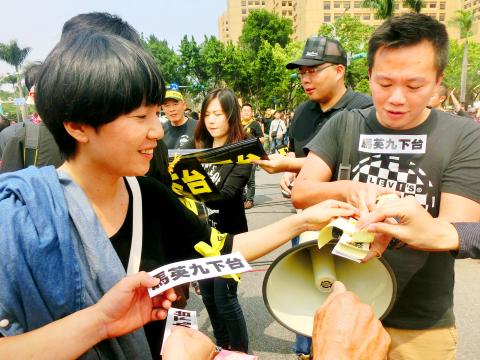From all walks of life, supporters of the “Sunflower student movement” took to the street in Taipei yesterday, marked by festivity, diversity and order.
An hour before the scheduled start of the event at 1pm, the “black-clad army” — dress code for the protest against the government’s handling of the controversial cross-strait service trade pact — emerged from nearby MRT stations and packed the designated protest site in front of the Presidential Office Building on Ketagalan Boulevard.
“I am here to support these students. I’m here out of guilt because people of my generation have done too little. We owe these kids a better Taiwan,” said Chiu Shih-lung (邱仕龍), who is in his 70s.

Photo: Sam Yeh, AFP
Chiu, who came from Greater Kaohsiung, said he supported the students’ cause of safeguarding Taiwan’s democracy and demanding the withdrawal of the cross-strait service pact because “it endangers national security and sovereignty.”
“We must safeguard our island’s interests,” said Chin Mei Ching, a 29-year-old mother who was pushing her one-year-old daughter in a buggy. “We have to guard against China using the economy to control us.”
The majority of the protesters were students and young people.

Photo: Lo Pei-der, Taipei Times
They brought sunflowers, a symbol of the protests, and wore yellow ribbons that read “Fight for democracy, retract the service trade pact.”
Some posed with self-made banners, on which were slogans such as “Condemn state violence” and “I don’t want the service trade pact,” or demanding President Ma Ying-jeou (馬英九) and Premier Jiang Yi-huah (江宜樺) step down.
Alliance of Civil Action Against Ma Ying-jeou spokesperson Shen Chih-lin (沈志霖) stood in the crowd and gave out stickers that read: “Ma Ying-jeou step down” (馬英九下台).

Photo: Chang Wen-chuan, Taipei Times
Shen said he prepared 1,500 of the stickers and distributed them near the Jingfumen (景福門), which directly faces the Presidential Office Building, and 500 of them were taken by eager protesters in the space of one minute.
A man disappointed with Ma’s failed governance suggested Shen print a sticker that read: “Nine percent approval rating, Ma Ying-jeou step down,” adding: “How can Ma govern the nation or gain trust from the people with such a low approval rating?”
Separately, students from Taipei National University of the Arts brought 3,000 sunflower brooches they had made and gave them out to the protesters.

Photo: Lee Hsin-fang, Taipei Times
The students said that about 10 students worked on the brooches from 6pm on Saturday until early yesterday, with NT$30,000 of funds they had raised.
Half of the brooches were given out within 10 minutes, near NTU Hospital MRT Station’s exit No. 1, at 1pm. The students said they kept the rest for distribution at the legislature.
Like their peers at the week-long sit-ins around the legislature compound, besieged by students and other activists and protesters since March 18, university professors made the street their classrooms, holding discussions and having students express their views about the trade deal with China.
A student spoke through a loudspeaker to his classmates from Soochow University, saying that he believed young people “would see a different face of society when they are on the street” and that would be at least as meaningful — if not more meaningful — as studying in the library or doing laboratory research.
Designer Chiang Lin Chia-jen (姜林家真) held a handmade, helmet-shaped umbrella that read: “Don’t hit my head” to protest against the violence the government used against unarmed student protesters at the Executive Yuan on Monday morning.
In front of the Legislative Yuan, a university junior student surnamed Hu (胡) set up a tent with a sunflower painted on it, inviting protesters to help use their fingerprints to color the sunflowers — to symbolize that the student movement is a result of the gathered strength of the people.
Many people lent their fingerprints, and the painting was almost finished by noon.
Hu said she had taken pictures of everyone who left a handprint on it, and that she will upload the photographs and the final painting on a Facebook page, in memory of “the year we stood up for the student movement.”
Yesterday’s protest was aimed at more than just the trade agreement, which was unilaterally passed through its committee without deliberation by Chinese Nationalist Party (KMT) lawmakers on March 17 and sparked the student-led movement, as non-governmental organizations (NGOs), which worked with the students to organize the protest, also took the opportunity to promote their causes.
A total of 22 NGOs, which focused on a wide range of social issues, such as gender, education, culture and environment, set up booths on Zhongshan S Road.
The student movement has received strong support for a reason, Northern Coast Anti-Nuclear Action Alliance chief executive Kuo Ching-lin (郭慶霖) said.
“People support the movement because they understand that Taiwan has a long way to go as a democracy. For years, the government had always made unilateral decisions without consulting the people, such as the construction of nuclear power plants and nuclear waste storage sites,” Kuo said.
“Most people no longer trust the government,” he added.
Politicians have taken a back seat in the protests, with Democratic Progressive Party (DPP) heavyweights choosing to participate in the protest quietly, without drawing too much attention.
Wearing a black shirt, DPP Chairman Su Tseng-chang (蘇貞昌) said he attended the event as a citizen, while former DPP chairperson Tsai Ing-wen (蔡英文) praised the students’ courage and discipline and urged Ma to ease people’s suspicions by making substantial promises.
The DPP Central Committee had instructed its members who plan to take part in year-end elections not to attend the demonstration wearing their campaign vests.
In addition, election flags and campaign vehicles were prohibited at the protest sites.
Additional reporting by Huang Hsin-po and agencies

DAREDEVIL: Honnold said it had always been a dream of his to climb Taipei 101, while a Netflix producer said the skyscraper was ‘a real icon of this country’ US climber Alex Honnold yesterday took on Taiwan’s tallest building, becoming the first person to scale Taipei 101 without a rope, harness or safety net. Hundreds of spectators gathered at the base of the 101-story skyscraper to watch Honnold, 40, embark on his daredevil feat, which was also broadcast live on Netflix. Dressed in a red T-shirt and yellow custom-made climbing shoes, Honnold swiftly moved up the southeast face of the glass and steel building. At one point, he stepped onto a platform midway up to wave down at fans and onlookers who were taking photos. People watching from inside

MAKING WAVES: China’s maritime militia could become a nontraditional threat in war, clogging up shipping lanes to prevent US or Japanese intervention, a report said About 1,900 Chinese ships flying flags of convenience and fishing vessels that participated in China’s military exercises around Taiwan last month and in January last year have been listed for monitoring, Coast Guard Administration (CGA) Deputy Director-General Hsieh Ching-chin (謝慶欽) said yesterday. Following amendments to the Commercial Port Act (商港法) and the Law of Ships (船舶法) last month, the CGA can designate possible berthing areas or deny ports of call for vessels suspected of loitering around areas where undersea cables can be accessed, Oceans Affairs Council Minister Kuan Bi-ling (管碧玲) said. The list of suspected ships, originally 300, had risen to about

A Vietnamese migrant worker yesterday won NT$12 million (US$379,627) on a Lunar New Year scratch card in Kaohsiung as part of Taiwan Lottery Co’s (台灣彩券) “NT$12 Million Grand Fortune” (1200萬大吉利) game. The man was the first top-prize winner of the new game launched on Jan. 6 to mark the Lunar New Year. Three Vietnamese migrant workers visited a Taiwan Lottery shop on Xinyue Street in Kaohsiung’s Gangshan District (崗山), a store representative said. The player bought multiple tickets and, after winning nothing, held the final lottery ticket in one hand and rubbed the store’s statue of the Maitreya Buddha’s belly with the other,

Japan’s strategic alliance with the US would collapse if Tokyo were to turn away from a conflict in Taiwan, Japanese Prime Minister Sanae Takaichi said yesterday, but distanced herself from previous comments that suggested a possible military response in such an event. Takaichi expressed her latest views on a nationally broadcast TV program late on Monday, where an opposition party leader criticized her for igniting tensions with China with the earlier remarks. Ties between Japan and China have sunk to the worst level in years after Takaichi said in November that a hypothetical Chinese attack on Taiwan could bring about a Japanese